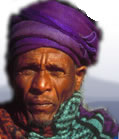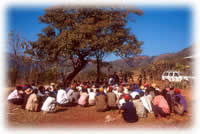 |
 |
||
 |
|||
|
RELATED THEMES development social relationships spiritual beliefs OTHER LOCAL THEMES BACKGROUND |
social institutions
Both the Mahber and the Senbetie are described as being practised "for the salvation of the soul": "The Mahber feast is prepared and eaten at the home of the member. Twelve persons who have the same patron saint.will form a Mahber and celebrate the day once a year by taking turns and preparing the feast for three or four days"; "the Senbetie can have 20-100 members who may be spouses, neighbours, and they eat the feast at church every month or year depending on your turn" (Ethiopia 1). The Iqub is a traditional rotating credit and savings association. These institutions have existed for generations regardless of the different regimes but most are now in decline; many narrators express regret that they can no longer afford to lay on the traditionally lavish feasts associated with such institutions. Mention is also made of the Muslim community activity of Tertim, where people come together for daily worship in the mosque and a communal breakfast. Some of these institutions are now being encouraged by development agencies. For example, SOS Sahel works through Qire to implement seed and food banking. They recognise the importance of capacity-building for such traditional institutions taking on additional responsibilities. However, they are careful not to rely too heavily on the Qire and risk undermining its traditional role, nor do they see any need to "modernise" a system which has worked well for so many generations. quotes about social institutions"[If our customs were to die out] that would be like the merger of the sky and the earth! We now participate in the Senbetie and Mahber and respect the Holy Ark consecrated to our patron saints. If these customs die or are abandoned, then we have forsaken our religion and it would be the end of everything. These are customs which we have inherited from our fathers. They were there at the time of Emperor Haile Sellassie and the Derg. If these customs disappear then we are going to face the unknown. When my son grows up a bit, I will take him to the Senbetie so that he will inherit the custom and do the same when he becomes an adult. Then he will say this cup [for the Senbetie drink] was my mother's and he will do the same for his children." "In the old days we used to roast two or three laden of cereals for the Senbetie and feed this to the poor at church to get salvation for our soul. We also commemorated St. Mary's day by preparing feasts at our homes. Nowadays the food shortage has forced us to reduce the scale of the feast, but we have not abandoned making bread and feeding the poor at home. Although the Mahber has decreased, young students have now organised into spiritual groups to serve the church. They also fast. This was not a common practice in the old days." "We have Tertim...every day we go to the mosque... We make coffee and have breakfast together. Then we pray collectively praising the Prophet. When that is finished we bless each other and part...[Tertims still] function the way our fathers organised them. The only change in the Tertim is that there are now more members and we prepare bread for breakfast on a bigger stove plate...When we have a problem, we discuss it after coffee. When there is a guest who has no relatives he will have breakfast with us, drink the coffee together and leave. That is good for him." |
|
 The main social institutions are Qire (or Idir), Senbetie, Mahber and Iqub. All are associated with Orthodox Christianity. Each is a membership association and involves members contributing to a common fund, upon which individuals can then draw. The Qire covers funeral expenses and provides a funeral meal for the bereaved:
The main social institutions are Qire (or Idir), Senbetie, Mahber and Iqub. All are associated with Orthodox Christianity. Each is a membership association and involves members contributing to a common fund, upon which individuals can then draw. The Qire covers funeral expenses and provides a funeral meal for the bereaved: